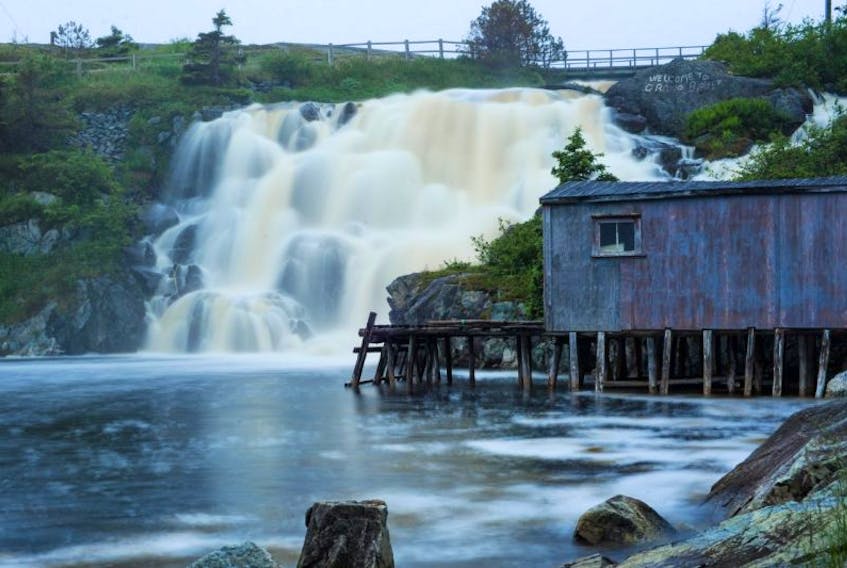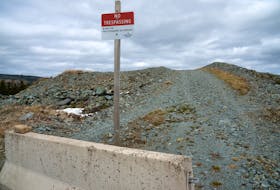GRAND BRUIT, N.L. — Gordon Farrell deftly guides his filleting knife down the side of a fresh codfish.
With a slight flick of his left hand, the delectable piece of fish slides into a beef bucket full of water where it joins other pieces of sliced seafood.
Farrell then moves on to slitting another fillet, cracking the neck and removing the tongue before throwing the remains to the seagulls eagerly awaiting a meal.
Every slight shift of his weight causes the fishing stage to creak in disgust.
Mist clings to his forest green rain gear as he repeats the same process for a few more fish.
Even on this remote shore, seafarers take advantage of summer’s recreational cod fishery.
In between fish, Farrell exchanges light banter with his wife, Linda, friend Jim Billard and me.
Every year, the Farrells, Billards and others make their return to the crescent-shaped harbour split by a roaring waterfall.
It’s been close to a decade since there was steady residency in Grand Bruit. The last residents left their homes for good in 2010 after the provincial government agreed to give families upwards of $100,000 to relocate.

A pair of abandoned photos rest on a chest in an empty room
inside of the homes in Grand Bruit. — Troy Turner
Some went to Port aux Basques and Burgeo, while others made the move to La Scie.
Their way of being was nearing the end of its lifespan and their only recourse was to leave for what they believed to be better prospects.
They never forgot their home, though.
“It hurt to leave,” said Linda Farrell.
While she left three years before the rest of the community, the sting was still there.
Farrell was the custodian and secretary at the Grand Bruit All-Grade School when it was closed in June 2007. At the time, there were just two students in Grade 9, who would move away to attend their last three years.
However, there was no high school to go to and it became time to look at continuing their schooling in another community.

The clock in one of the schools rooms in Grand Bruit still reads 2:45 p.m.
A Grade 9 graduation was planned and the school was done up. It would be the last one held in Grand Bruit.
A decade later, the school is in great shape. In the time between its closing to resettlement, it took on the role of social club.
Empty dart cases hang on one of the walls, aerobic and weight equipment rest in one of the four rooms in the building.
There’s still evidence of it being school with seven empty lockers in the foyer, old textbooks on a shelf in the corner and redundant computers gathering dust in a room.
The concrete pathways — there were no cars — of Grand Bruit are eerily dark and empty.
A fog hung over the harbour during my stay in the community. The blanket of grey only added to the feeling of loneliness that permeates Grand Bruit.

A pair of crows sit on the front bridge of an empty house in Grand Bruit.
— Troy Turner photo
“The last Christmas, there was eight people there,” said Marilyn Billard.
She moved to Grand Bruit in 1977 and stayed for 20 years, leaving in 1997. She wrote a book on her community in 2012.
“It used to be a busy little community.”
There’s also a natural beauty here but it’s a stark contrast now.

Just a few of the people who come back to Grand Bruit every summer include, from left,
Joe Billard, Clyde Billard, Jim Billard, Gord Farrell and George Billiard. — Troy Turner photo
The waterfall is just a small piece in the puzzle that makes Grand Bruit. The rocky crags that act as gates to the harbour mouth quickly give way to a lush, rolling hillside.
Houses sit on top of each other and resemble more of a Newfoundland postcard than a look at the history this province with resettlement.
There’s a large meadow where the townspeople raised Canada geese, turkeys and other livestock that is found a few feet from the helipad at the top of the community.
“Grand Bruit was very peaceful,” said Billard.
“You could hear the kids running and the waterfalls.”
She makes the return trip to Grand Bruit every summer for a couple of weeks scattered across three months.
It’s always special to come home. Every traveller looks for certain landmarks and sights that guide them and let them know they’re not far from home.
For Grand Bruitters, there’s one thing they all look for. The United Church and its bell tower isn’t hard to miss on a clear day.
It stands above everything else in the community and is noticeable from the water.
“When you see the tower on the hill, it’s a feeling like no other,” said Billard.
Talking to residents, there were a couple of places you had to visit. There was the church to sign the guest book, and the top of the waterfall.
But there was also the local watering hole located just a short walk — everything was a short walk — from the school.
It’s called the Cramalot Inn. It sounds like a hotel, but it’s just a shed belonging to Joe Billiard with a million stories to tell.

A watch and lantern are just a few of the household items left in Grand Bruit.
— Troy Turner photo
The deck isn’t as sturdy as it once was, but it still looked like the spot for anyone who wanted to spin a few yarns.
“That was always a popular spot for the men,” said Linda Farrell. “There’d be so many in there, some would have to stand out on the deck.”
The red and white sign was given to the residents by a pair of yachters who stopped in a couple of years ago.
The name is simple as well. The people of Grand Bruit would “cram a lot of people in” the place when it came time for a couple of adult beverages.
Roger Spencer would make the trip from Burgeo to Grand Bruit every summer when school let out in late June. His mother was from there and he always looked forward to getting back.
This was the 1990s and he knew the names of the bays and inlets he’d pass on the journey by heart and often admired the way it seemed like blue hills followed them the entire time.
“We knew each rock and the distance it was from Grand Bruit,” said Spencer.

A bouy hangs from a dilapidated wharf. — Troy Turner photo
If you were to ask, he would tell you Grand Bruit was freedom. Children were free to roam all over the countryside, left to explore the many crags and crevices that exist on the unforgiving south coast.
Grand Bruit was mornings spent on the wharf, followed by afternoons crawling around the hillside in search of ripe berries or chasing the brooks with your rod in hand.
“Freedom,” says Spencer.
“It was freedom.”
Why am I even here?

Nicholas Mercer, still recovering from his ferry ride, standing on the wharf in
front of Grand Bruit’s majestic waterfall. — Troy Turner photo
It’s somewhere between Rose Blanche and La Poile that I start questioning my existence.
The unforgiving rocking of the Challenger One is causing me undue amounts of discomfort as sheets of sweat slide down my face.
We’ve only just started our trip to Grand Bruit and I’m already regretting it. This ride from hell is also making me question every decision I’ve ever made up until now.
Why did I become a journalist?
Why would I ever suggest doing this story?
How come I never kissed that girl when I had the chance?
These are all questions that popped into my head like a mental game of Whack-a-Mole. I knocked one down and another decided to mess with me.
The continuous inner monologue only halted when seasickness took a firm hold of me.
And things then got messy.
After that, my mind metronome was at it again.
I became a bit of a La Poile legend that day. There were people telling their friends about the city slicker from Corner Brook who couldn’t handle the ferry over. All I could do was flash them a sheepish grin and promise I’ll do better next time.
When I got back to La Poile, I was assured the ride back to Rose Blanche would be that much better.
They remembered me. Of course, they probably don’t see many strangers going to Grand Bruit.
Still a legend, though.
Things never improved when I hopped aboard the 22-foot boat meant to bring us the rest of the way.
My stomach still quivering from its earlier adventure, never quite got settled for the remainder of the trip to our final destination.
It never reached the same horrific levels of the ferry ride, but they were rough.

This house sits on the hill next to the school. — Troy Turner photo
Still it was hard not to marvel at the unforgiving shoreline along this stretch of the south coast.
My mood started to brighten and I remembered why we were there.
It was going to be an adventure of a lifetime.
And you know what?
It kind of was.
Grand Bruit takes hold of you
The thought of Grand Bruit sticks with you.
The empty houses, collapsed fish stages and the distinct lack of light take ahold of you, hesitant to loosen its grip.
Locally known as “Gran Brit,” it has been seven years since the population resettled, leaving for places like Port aux Basques, Burgeo and La Scie.

There are almost a dozen stages scattered along the shore in
Grand Bruit. — Troy Turner photo
It is hard to describe the feeling that comes over you when you’re treading where some people have not been in close to 10 years.
As much as it feels like you’re intruding on their lives, you’re excited about the prospect of exploring their home.
Making our way through some of the abandoned houses, there’s always the sense the front door will creak open and the last resident will come through the opening.
Even with them gone, it is possible to catch a glimpse into their lives. From art on the walls, an empty bottle of scotch on a shelf and VHS copies of “Dirty Harry” and “Gangs of New York” stacked neatly on a living room dresser, you get a sense of what made the them who they are.
Even when standing in a school closed for 10 years, there was the sense your morning slumber would be interrupted by the shrill of the opening bell or the teacher calling her short attendance list.
Time travel is against the laws of physics, but it feels possible on the shores of Grand Bruit.
There’s a sense you’re moving through phases of life as you walk through the community. Well-kept homes sit next to decaying ones, their vinyl siding a stark contrast from the chipped paint and clapboard of the others.
Back home, 2010 does not seem so far away, but here it feels like a lifetime away.

When darkness falls, a lone light shines from this home near the falls. — Troy Turner photo
Toilet paper left in the bathroom, split wood waiting for the slow burn of the wood stove and a child’s teddy bear placed in the corner made it seem like you were moving through time and space with each step in the abandoned community.
If you didn’t know any better, you’d think people were escaping some life-threatening event and had to rush to grab what they needed.
We were not alone in Grand Bruit. A little over half-a-dozen residents were spending parts of their summer there.
They go back every spring and summer to re-live what they’ve lost.
Some fish, others are just there to make amends. It’s as if they’re saying “I’m sorry” every day for leaving for so long.
Grand Bruit is a special place to them. Like all Newfoundlanders and Labradorians, they long for home when they’re away.
I’m like them, in a way.
I know I’ll be back.
Nicholas Mercer is the online editor with The Western Star. He lives in Corner Brook and can be reached at [email protected]

The walkway to this home has fallen after years of being
beaten by the elements. — Nicholas Mercer photo









